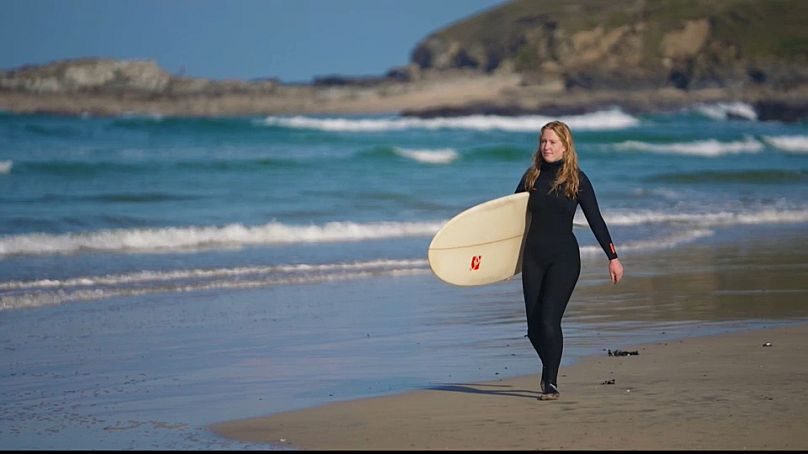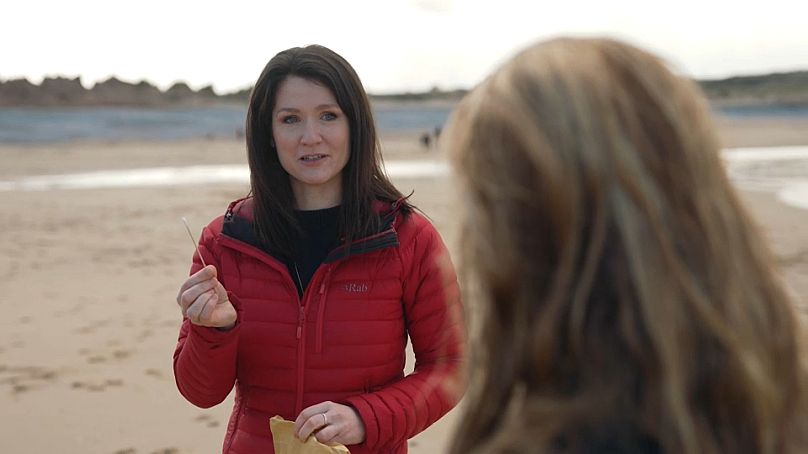European documentary highlights the link between oceans and human health
A new Euronews Series entitled ‘Oceans’ has focused on the work of ECEHH in a new documentary exploring the risks and opportunities for human health presented by oceans and the interconnections between the two.
Filming took place during March in Cornwall and involved expert insights from Professor William Gaze, Dr Anne Leonard and Dr Aimee Murray, together with Surfers Against Sewage.
The film will share the work across Europe in multiple languages, covering the impact of antimicrobial resistance on populations and also exploring work by doctors and researchers from the city of Roses, in northeastern Spain, who invited 24 oncological patients to take part in coastal activities over two years and contributes to a growing area of research exploring the many ways in which the sea impacts our health and well-being, from the food we eat to the air we breathe.
Izzy Ross, from Surfers Against Sewage comments in the film,
“It’s really important for my mental health, and for lots of people who live down here in Cornwall, it’s a really important part of our lives,” explained Izzy Ross, the Campaigns manager at the marine conservation charity, Surfers Against Sewage.
“But unfortunately sometimes we can’t get in the water because it’s not safe to do so.”
Izzy says that surfers are particularly vulnerable to the harmful effects of pollution, as they are constantly exposed to the water when rolling under the waves.
“Sometimes you swallow some of that water — it means that you are ingesting quite a lot of potentially harmful bacteria and viruses. Last year we had 720 reports, and some of those were really quite shocking — we had things like gastroenteritis, we had eye infections, ear infections, urinary tract infections, and even a case of kidney failure.”
To better understand the risks, surfers worked with researchers from the European Centre for Environment and Human Health at the University of Exeter Medical School. An EU-funded project analysed samples taken from surfers across the UK, and the findings were alarming.
Professor William Gaze explains, “We found that surfers are about three times as likely compared to people who don’t go in the water to carry antibiotic-resistant bacteria in their faecal microbiome sample. And this is really important because there’s potential for people to spread antibiotic-resistant bacteria to other people,” said Dr Anne Leonard, an environmental epidemiologist with the European Centre for Environment and Human Health at the University of Exeter Medical School.
Researchers found that streams carrying urban and agricultural waste into our seas are fuelling the evolution of drug-resistant pathogens. Such infections are already taking a heavy toll, rivalling that of the COVID-19 pandemic. By 2050, they may become the leading cause of death worldwide.
“Human and animal waste also includes antibiotic residues. And even though those are really dilute and low levels in water like river water and seawater, we are finding now that actually, it can still be at a level that can drive further antibiotic resistance,”
The laboratory experiments at the University of Exeter confirmed the very real health threat. The findings make it clear that the contamination of our oceans with dangerous substances is not only a concern for surfers and other frequent sea-goers, but for people all across the globe, regardless of economic status.
“It’s commonly thought that antibiotic pollution is more of a problem in low- and middle-income countries where they are producing the antibiotics and they have to discharge pharmaceutical waste, where they don’t have adequate sanitation infrastructure,” microbiologist Dr Aimee Murray told Euronews.
“But we showed that even in the UK there are sufficient levels of antibiotics to increase resistance,” she added.

